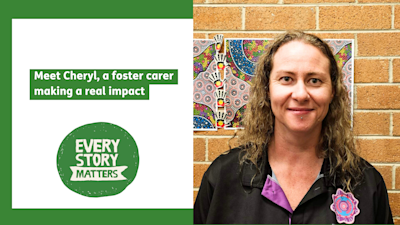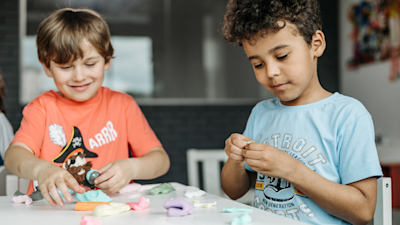The need for foster carers continues to grow in New South Wales and across Australia.

Image: A young girl and boy brushing their teeth and smiling at the mirror in a bathroom.
The need for foster and kinship carers continues to increase in Port Stephens, Maitland and Newcastle, New South Wales, with young children, primary school-aged children and teenagers in need of care.
Kathryn Allen, Regional Director for Northern NSW Child, Youth, and Family Services, said that in terms of supporting young people in foster care, there are simply not enough carers.
"It's a phenomenon that is being experienced across the world."

Image: A teenage girl stands between two people, she is wearing a white t-shirt and smiling at the camera.
According to the Australian Institute of Family Studies, more than 47,500 children and young people live in out-of-home care in Australia. Kathryn explains that it is not always down to care and protection issues.
"Children and young people come into care for reasons that are outside of a person's control, they might be unwell and need treatment and they have nobody in their network that can care for the child," Kathryn said.
"Long-term care is always the last option and some of the greatest outcomes we see are when families and carers can be really connected."
Becoming a foster carer or kinship carer is something that people think about for a long time.
"It's a process that they actually work through and they're working through when it's the right time for them to take that step,” Kathryn explained.
When it comes to matching a carer with a child, Kathryn highlighted that it depends on the carer's skills, capability, lifestyle and the needs of the child.
"You don't need to become a carer to care full-time for a child, you can become a carer to help out on weekends or be there if there's an emergency that comes up."
Providing care works differently for different people, at Life Without Barriers we support several different foster care options, including emergency or crisis care, respite, short-term, long-term, kinship care, and guardianship care.
Life Without Barriers also invests in wrapping lots of support around foster and kinship carers including ongoing support, training and access to unique networks – like MOCKINGBIRD FAMILY™.
MOCKINGBIRD FAMILY™ is an innovative support model for foster and kinship carers to create caring homes with family, culture and community!
"One of the things that we have successfully implemented is our MOCKINGBIRD FAMILY™ Program which has a carer coordinate a group of carers who act as a community of support for each other," Kathryn said.
“It means that there will be a group and a community of people who will be right there walking this journey with carers."
As well as benefitting foster and kinship carers, children and young people in constellations feel more connected to other children in out-of-home care! Foster carers involved in constellations, and their support team at Life Without Barriers, have said that sibling-like relationships formed in the model quickly.
For some of the young people, these close friend or sibling-like relationships are the first they have had.
Chris Skinner, Lead representative for MOCKINGBIRD FAMILY™ at Life Without Barriers, said:
“In seeing the great experiences of foster carers and children in other constellations, I have every confidence that this will only continue in the community, and we are very excited about that.
If you want to find out more about MOCKINGBIRD FAMILY™, watch this short video!
If you are interested in knowing more about becoming a foster carer in New South Wales, you can reach out via email at carers@lwb.org.au or phone on 1300 592 227.


